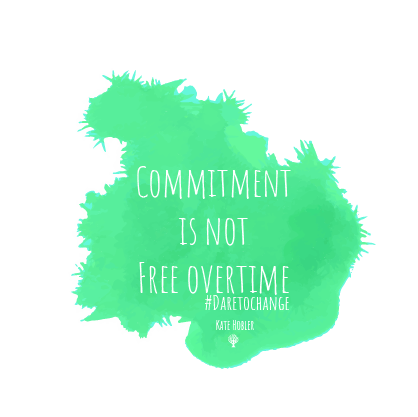 Commitment is key. Commitment is somethins every team, every manager, every organization wants and needs. Commitment promises better results, engaged people, good relationship with work and many other benefits.
Commitment is key. Commitment is somethins every team, every manager, every organization wants and needs. Commitment promises better results, engaged people, good relationship with work and many other benefits.
The problem is that it can be misunderstood.
Some time ago a certain Quora question has been published:
You can find the original thread here: [link]
A certain CEO asks how to increase commitment, because people only work in their work hours, not staying overtime.
Comments solved the problem quickly, calling out slavery and other forms of opression by expecting self-inflicted overtime.
Sorry to break it to you, dear CEO, but this is not commitment. Commitment is not free overtime.
So what is Commitment?
Let's look at a definition from APA:
"Obligation or devotion to a person, relationship, task, cause, or other entity or action" [source]
and from a wide - sourced wiki:
"Commitment is the mental or physical act of more directing increased resources to an activity or interpersonal relationship. Processes of cognitive dissonance may then increase the perceive value of the target and this may lead to increased involvement and motivation." [source]
As you can see, Commitment towards a person requires a relationship - and a relationship is two-sided. You cannot expect commitment and give nothing back. In fact commitment in a team creates teamwork and safe environment, where you can trust that someone did everything hty possibly could to help others, but you will also do the same. Sometimes this will mean staying longer, sometime this will mean leaving early to rest and come back at 100% of your capacity.
Commitment is not universal - it will mean something different for each person. For example to me as a business owner it means I can skip my wage if the funds run low. To my marketing magician it mean she can work late at night to start a campaign at the right moment. And all those meanings come from individuals committing to others, goals or organizations.
It's a good idea to ask your team what does that mean to them. Once you know it, you can start building a culture that will not only suit all your team members, but also bring you closer to achieving common goals.
Rich Visotcky, PST wirites:
To open with another potentially shifting statement for some: Commitment isn’t something taken from one person to another, it’s something given by one person to another or even to themselves. If someone demands commitment from you, what they’re really doing is creating an environment of us vs. them, one of fear, and one of uncertainty, no matter how well worded. Instead, if a person commits themselves to something, they feel a sense of ownership and are more likely to follow through with that commitment.
Let’s bring this back to “free overtime.” If I’m coming from the point of someone looking for overtime from my team because they’re “committed” to the work, my company, their salary, etc. then all I’m likely to get are disengaged employees who hope they keep getting paid while secretly wishing for a new job. Contrast that with my personal commitment to the work we’re doing and the goals we’re trying to achieve. In this scenario, I’m in it for more than the money. I want to see our goals realized, people served, and even my personal craft in the work, and that purpose will propel me forward. If overtime is ever “free” it’s because people gift it to you, just like they would gift their time to an organization or movement they identify with.
What's your opinion? Let me know in the comments below!
You can also join me and other PSTs - Rich Visotcky, François Fort and others on a tag-me discussion on Linkedin [link]. You also can be tagged to provide your opinion on the next #daretochange - just let me know!

